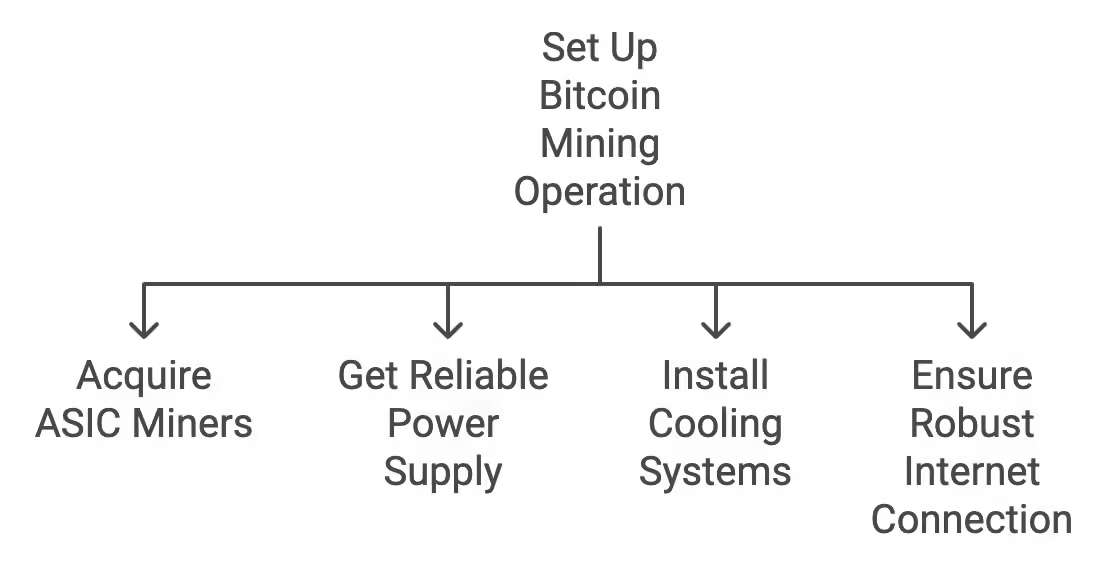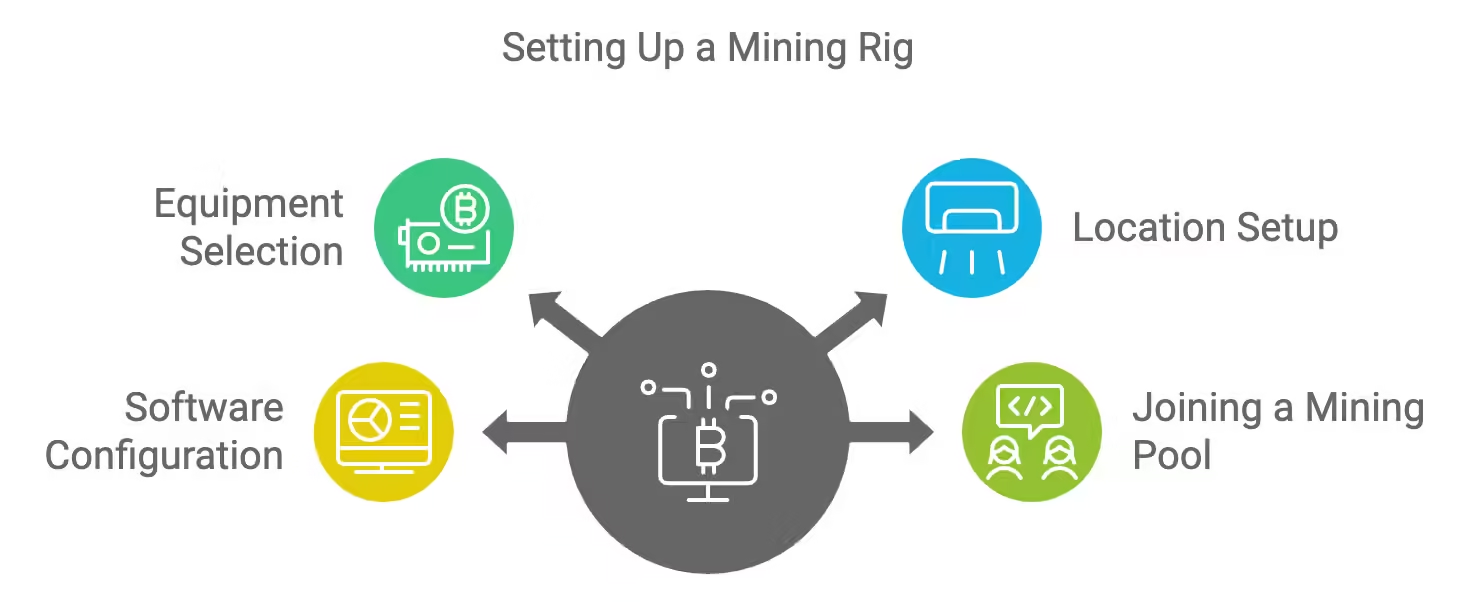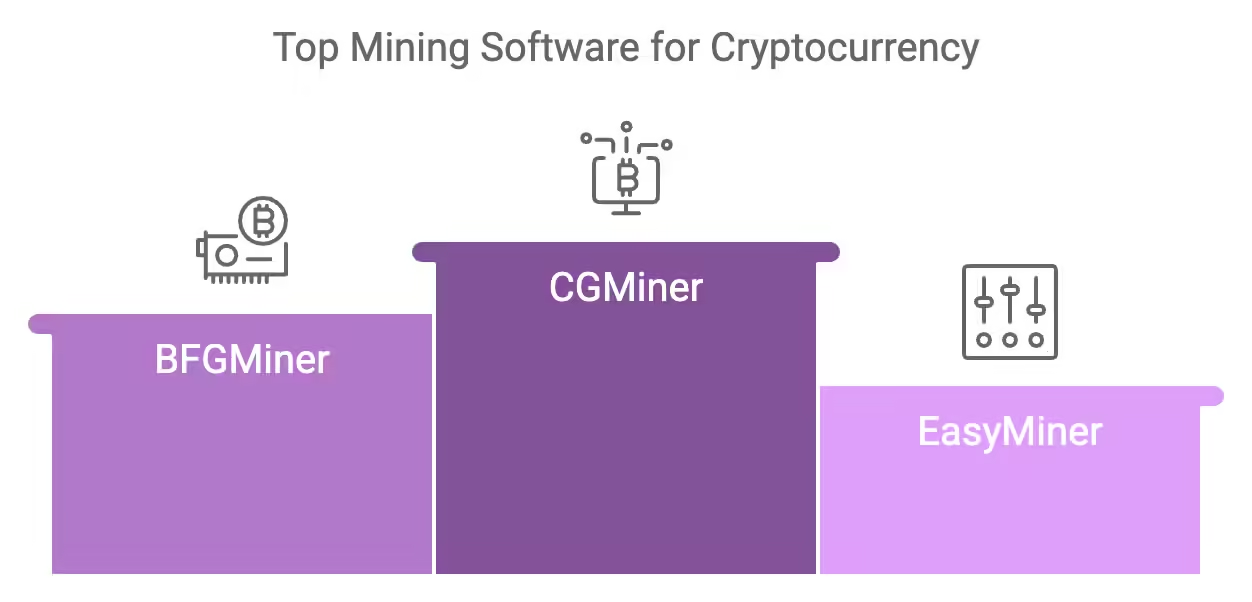Is Crypto Mining Legal in India? Exploring Bitcoin Mining Opportunities
The rise of cryptocurrencies has led to many people exploring the opportunities presented by crypto mining. In India, the legal status of crypto mining, particularly bitcoin mining, remains a significant concern for potential miners. This article delves into the legal implications, requirements, profitability, tax considerations, challenges, and best practices for those looking to embark on bitcoin mining operations in India.
Tax Implications for Miners
In India, crypto mining is legal, but it carries hefty tax implications. When you mine cryptocurrency, you’re taxed on its fair market value (FMV) at the time of minting, which can reach up to 30%. Imagine unearthing a hidden treasure, only to find out you must share it with the tax collector.
What is the Legal Status of Crypto Mining in India?
Is bitcoin mining legal in India?
Bitcoin mining is a process that involves validating transactions on the bitcoin blockchain and adding them to the public ledger. In India, the legal status of crypto mining has been somewhat ambiguous due to the lack of specific regulations governing cryptocurrency. While the Reserve Bank of India had previously issued a ban on banking services for cryptocurrencies, this decision was overturned by the Supreme Court in 2020. Therefore, as of now, bitcoin mining is considered legal in India, but miners must remain compliant with existing laws and regulations regarding financial transactions and data privacy.
This legal ambiguity means that while bitcoin mining is technically allowed, miners should be aware of the evolving landscape of cryptocurrency regulations in India. It is crucial for those interested in mining to stay informed about any changes in legal status that could affect their operations. Moreover, as the global crypto market continues to grow, India might also adapt its legal frameworks to better regulate and support emerging technologies like blockchain and cryptocurrency, which could further influence the legal status of mining activities.
What are the legal implications of crypto mining?
The legal implications of crypto mining in India primarily revolve around taxes, financial regulations, and compliance with local laws. For instance, crypto miners must be aware that income generated from mining activities may be subject to income tax, which is a critical consideration for anyone entering this space. Additionally, miners need to ensure that their operations do not violate any existing laws related to energy consumption or environmental regulations, as these can lead to legal challenges.
Moreover, the legal landscape is constantly evolving, and new regulations could emerge that impact how crypto mining is conducted. For example, guidelines regarding the use of renewable energy for mining operations may become more stringent, pushing miners to adapt their practices accordingly. Thus, staying updated on legal developments is vital for miners to operate within the law and avoid potential penalties or shutdowns of their mining operations.
How does the legal landscape affect mining operations?
The legal landscape plays a crucial role in shaping mining operations in India. With the lack of clear regulations, miners often face uncertainty regarding their rights and obligations. For instance, the absence of specific laws governing the operation of mining rigs can lead to confusion about licensing, permits, or operational limits. This uncertainty can deter potential investors from entering the mining space, ultimately impacting the overall growth of the crypto market in India.
Furthermore, as the government and regulators develop new policies around cryptocurrencies, miners may need to adjust their strategies to remain compliant. For example, the implementation of stricter laws regarding the taxation of digital assets could impact profitability for miners, necessitating careful financial planning. Ultimately, understanding how the legal landscape affects mining operations is essential for miners to navigate the complexities of operating in a rapidly changing environment.
What are the Requirements for Starting Crypto Mining in India?
What mining equipment do I need to mine bitcoin?
To successfully mine bitcoin, individuals need specialized mining equipment known as mining rigs, which are designed to perform the complex mathematical calculations required to validate transactions on the blockchain. The most effective mining rigs are typically Application-Specific Integrated Circuits (ASICs), engineered for optimal performance in mining cryptocurrencies. These machines are significantly more efficient compared to traditional computers and are capable of processing transactions at a much faster rate.

In addition to ASIC miners, miners also require other components to set up their operations effectively. This includes a reliable power supply, cooling systems to prevent overheating, and a robust internet connection to maintain consistent communication with the blockchain network. Collectively, these elements form the backbone of a successful bitcoin mining operation, making it essential for miners to invest in quality equipment to enhance their chances of profitability in the competitive mining landscape.
How do I set up a mining rig in India?
Setting up a mining rig in India involves several steps that require careful planning and execution. First, miners must select the appropriate mining equipment, such as ASICs, based on their budget and mining goals. After acquiring the necessary hardware, the next step is to find a suitable location for the rig, ideally one with adequate ventilation, a stable power supply, and a reliable internet connection to ensure uninterrupted mining activities.

Once the hardware is in place, miners need to configure the mining software that will allow them to connect to the bitcoin network. This software is crucial as it facilitates the mining process and tracks the performance of the rig. Additionally, miners may choose to join a mining pool, which allows them to combine resources with other miners, thereby increasing their chances of successfully mining a block and receiving rewards. Overall, setting up a mining rig requires significant investment and technical knowledge, making it essential for new miners to conduct thorough research before starting their operations.
What software is required for cryptocurrency mining?
To effectively mine cryptocurrencies, miners must utilize specific mining software tailored to their chosen hardware and mining pool. Popular mining software options include CGMiner, BFGMiner, and EasyMiner, each offering unique features that cater to different mining setups. These software solutions enable miners to connect their rigs to the bitcoin network, monitor their performance, and manage their mining operations efficiently.

Additionally, miners may need to configure their software settings to optimize performance based on their equipment’s capabilities and the mining pool’s requirements. This configuration process may involve adjusting parameters such as mining intensity, frequency, and hardware compatibility. Ultimately, the right mining software is crucial for miners to maximize their efficiency and profitability while navigating the competitive landscape of cryptocurrency mining.
Is Cryptocurrency Mining Profitable in India?
What factors affect the profitability of mining?
The profitability of cryptocurrency mining in India is influenced by several factors, including the cost of electricity, hardware efficiency, and market conditions. Electricity costs can vary significantly across different regions in India, making it essential for miners to factor in their local rates when calculating potential profit margins. Additionally, the efficiency of mining rigs plays a crucial role, as more powerful and energy-efficient models can yield better returns on investment.
Market conditions, such as bitcoin’s price volatility, also impact mining profitability. When bitcoin prices rise, mining becomes more lucrative, attracting more miners and increasing competition. Conversely, during market downturns, profitability can decline, leading some miners to reconsider their operations. Therefore, understanding these factors and monitoring market trends is vital for miners to make informed decisions and maximize their earnings in the dynamic world of cryptocurrency mining.
How to calculate the cost of acquisition for mining rigs?
Calculating the cost of acquisition for mining rigs involves considering several components, including the initial purchase price, setup costs, and ongoing operational expenses. The initial purchase price of mining equipment, particularly ASIC miners, can vary significantly based on performance and brand. It’s essential for miners to research and choose equipment that aligns with their budget and mining goals.
In addition to the initial costs, miners should also factor in setup expenses, such as cooling systems, power supplies, and any additional infrastructure required to support their mining operations. Ongoing operational costs, including electricity and maintenance, should also be considered when determining profitability. By accounting for all these factors, miners can develop a comprehensive understanding of their total cost of acquisition, helping them make informed decisions regarding their mining investments.
Are there mining pools that offer better returns?
Joining a mining pool can significantly enhance a miner’s chances of earning rewards, as these pools combine resources from multiple miners to increase the likelihood of successfully mining a block. Some mining pools are known for offering better returns due to their size, efficiency, and distribution of rewards among participants. When selecting a mining pool, miners should consider factors such as pool fees, payout structures, and the overall reputation of the pool within the mining community.
Furthermore, some pools may offer unique features, such as lower latency connections or additional support for different cryptocurrencies, which can also influence returns. By thoroughly researching and evaluating various mining pools, miners can make informed decisions that align with their mining strategies and goals, ultimately optimizing their potential for profitability in the competitive landscape of cryptocurrency mining.
What are the Tax Implications for Crypto Miners in India?
Do I need to pay income tax on mined cryptocurrencies?
In India, income generated from mined cryptocurrencies is subject to taxation under the Income Tax Act. This means that miners must report their earnings as part of their taxable income and pay the corresponding income tax on their profits. The tax treatment of mined cryptocurrencies is similar to that of other forms of income, and miners should maintain accurate records of their mining activities to comply with tax regulations.
Additionally, the classification of mined cryptocurrencies as virtual digital assets may lead to different tax implications based on the nature of the transactions carried out. Miners should consult with tax professionals to ensure compliance with tax laws and to understand how their mining activities may impact their overall tax liability. By staying informed about the tax implications of crypto mining, miners can avoid potential issues with tax authorities and plan their finances more effectively.
What are the reporting requirements for crypto mining income?
Miners in India are required to report their income from cryptocurrency mining during the annual income tax filing process. This includes disclosing the total income derived from mined cryptocurrencies, along with any associated expenses incurred during the mining operations. Accurate reporting is crucial, as failure to disclose income can result in penalties or legal repercussions from tax authorities.
Additionally, miners should maintain detailed records of their mining activities, including transaction logs, equipment costs, and operational expenses. This documentation will support their reported income and provide transparency to tax authorities if required. By adhering to reporting requirements, miners can ensure compliance with tax regulations and mitigate the risk of facing audits or disputes over their cryptocurrency earnings.
What Challenges Do Miners Face in India?
What are the common legal challenges for bitcoin miners?
Bitcoin miners in India often face a range of legal challenges that can impact their operations. One of the most significant challenges is the uncertainty surrounding regulations relating to cryptocurrency. The lack of clear guidelines can create confusion for miners, particularly regarding legal compliance, taxation, and operational permits. This ambiguity can lead to potential legal disputes if miners inadvertently violate any existing laws or regulations.
Additionally, there may be challenges related to energy consumption, especially in regions with strict regulations on electricity usage. Miners must be mindful of local laws that could restrict their operations based on energy consumption limits or environmental impact concerns. By understanding these legal challenges, miners can take proactive steps to ensure compliance and navigate the complexities of the legal landscape in India.
How does the crypto market volatility impact mining?
The volatility of the cryptocurrency market significantly impacts the profitability and feasibility of mining operations in India. Fluctuations in the prices of cryptocurrencies, particularly bitcoin, can lead to rapid changes in mining profitability. During market upswings, miners may experience increased earnings, while downturns can result in diminished returns, prompting some miners to reevaluate their operations.
This volatility also affects investment decisions related to mining equipment. For instance, miners may hesitate to invest in high-performance rigs during bearish market conditions due to uncertainty about future profitability. Overall, understanding and managing the risks associated with market volatility is crucial for miners to sustain their operations and maximize their returns in the ever-changing landscape of cryptocurrency mining.
Are there any restrictions on mining operations in India?
While bitcoin mining is legal in India, miners may encounter certain restrictions that vary by region. Local governments and regulatory authorities may impose regulations related to energy consumption, environmental impact, and operational licensing. For example, in some states, there may be limits on the amount of energy that mining operations can consume, which can affect the scalability of mining setups.
Moreover, miners must also be aware of any licensing requirements or permits needed to operate their rigs legally. These restrictions can vary widely, making it essential for miners to conduct thorough research and ensure compliance with local regulations to avoid potential legal issues. By understanding and navigating the restrictions surrounding mining operations, miners can position themselves for success in the evolving landscape of cryptocurrency in India.
How to Start Mining Bitcoin in India?
What are the steps to join a mining pool?
Joining a mining pool is a strategic move for miners looking to increase their chances of earning rewards in the competitive landscape of bitcoin mining. The first step in joining a mining pool is to research and select a reputable pool that aligns with your mining goals, taking into account factors such as fees, payout structures, and the pool’s overall reputation. Once a pool is selected, miners typically need to create an account on the pool’s website and configure their mining software to connect to the pool’s server.
After successfully joining the pool, miners must then set up their mining rigs to start contributing their computational power. It is essential to monitor performance regularly and ensure that the rig is operating efficiently within the pool. By participating in a mining pool, miners can share resources and increase their probability of successfully mining blocks, ultimately optimizing their returns in the ever-competitive crypto mining landscape.
Q: Is crypto mining legal in India?
A: Yes, as of now, crypto mining is legal in India. However, the legal landscape is constantly evolving, and it is advisable to stay updated with the latest regulations.
Q: What is the process of bitcoin mining?
A: Bitcoin mining is the process of validating bitcoin transactions and adding them to the blockchain. Miners use powerful computers to solve complex mathematical problems, and upon successful mining a block, they are rewarded with bitcoin.
Q: What equipment do I need to start mining crypto?
A: To start mining crypto, you will need mining rigs or ASIC miners, which are specifically designed for mining. Additionally, you will require mining software to connect your rig to the blockchain network.
Q: Are there any tax implications for crypto mining in India?
A: Yes, income earned from crypto mining is subject to income tax in India. Miners should keep records of their earnings and expenses related to mining operations for tax purposes.
Q: Can I join a mining pool in India?
A: Yes, joining a mining pool is a common practice for miners in India. It allows individuals to combine their resources and increase their chances of successfully mining a block, leading to more consistent and shared rewards.
Q: How profitable is mining in India?
A: Mining profitability in India depends on various factors, including electricity costs, mining equipment efficiency, and current cryptocurrency market prices. Conducting a cost analysis before starting mining operations is crucial.
Q: What are the legal implications of crypto mining?
A: While crypto mining is legal in India, miners must comply with relevant regulations, including tax obligations and any future laws governing virtual digital assets. It is essential to monitor the changing legal landscape.
Q: What are the risks associated with bitcoin mining?
A: Risks associated with bitcoin mining include fluctuations in cryptocurrency prices, high electricity costs, and potential regulatory changes that could impact the legality or profitability of mining operations.
Q: How do I choose the right mining equipment?
A: To choose the right mining equipment, consider factors such as the hash rate, energy efficiency, and cost of acquisition. ASIC miners are often recommended for their performance in mining Bitcoin specifically.
Q: What is the future of cryptocurrency mining in India?
A: The future of cryptocurrency mining in India will greatly depend on regulatory developments, technological advancements, and the overall growth of the crypto market. It is anticipated that as the crypto ecosystem matures, mining opportunities may expand as well.
How to successfully mine a block of bitcoin?
Successfully mining a block of bitcoin requires a combination of technical expertise, efficient hardware, and strategic planning. First and foremost, miners must ensure that they have the right mining equipment, such as ASIC miners, configured to maximize computational power and efficiency. Once the hardware is set up, miners need to join a mining pool to combine their resources with others, increasing the chances of mining a block.
After joining a pool, miners should continuously monitor their rig’s performance and make necessary adjustments to optimize its efficiency. Additionally, staying informed about network difficulty levels and market trends is crucial, as these factors can impact the likelihood of successfully mining a block. By approaching the mining process with diligence and strategic foresight, miners can enhance their chances of success and profitability in the bitcoin mining arena.
What are the best practices for new crypto miners?
For new crypto miners, adopting best practices is essential for maximizing efficiency and profitability. First, it’s crucial to conduct thorough research on the cryptocurrency mining landscape, including understanding the various types of mining rigs, software, and mining pools available. New miners should also create a budget that accounts for hardware costs, electricity expenses, and potential taxes to ensure they are financially prepared for the investment.
Additionally, joining online communities and forums dedicated to cryptocurrency can provide valuable insights and support from experienced miners. Networking with others in the field can help newcomers stay informed about industry trends and best practices. Prioritizing regular monitoring and maintenance of mining rigs will also help in identifying issues early and maintaining optimal performance. By following these best practices, new crypto miners can successfully navigate the complexities of the mining world and work towards achieving their financial goals in the cryptocurrency space.

